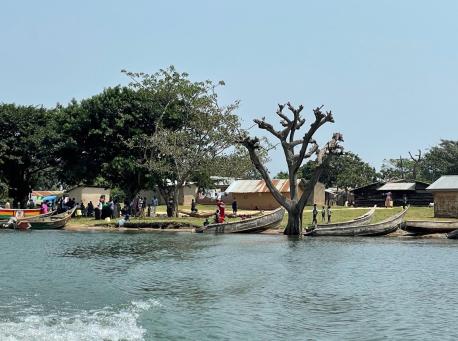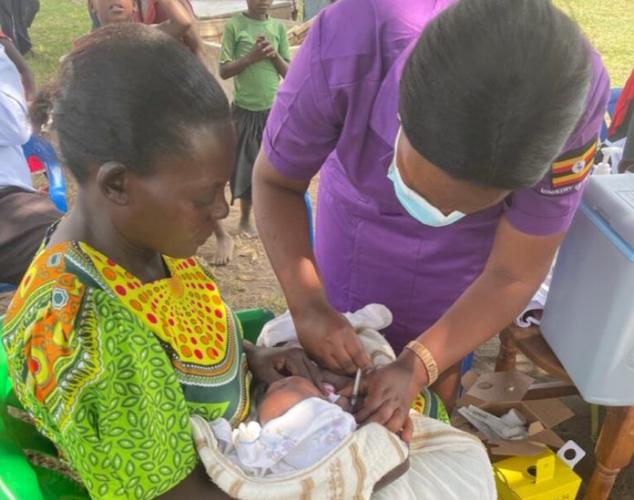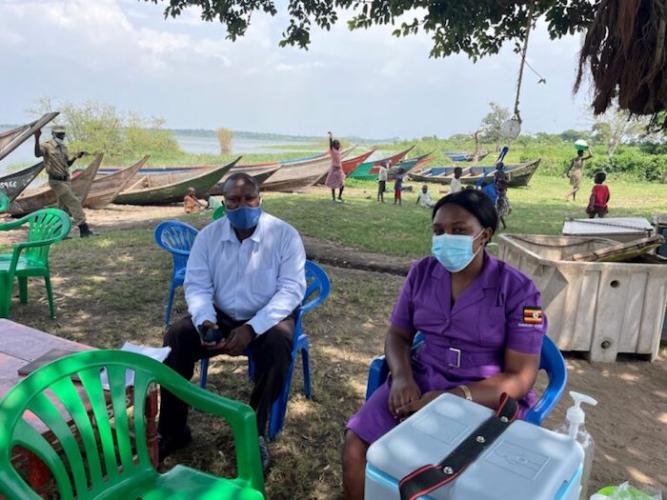
Using Data Innovation to Improve Health Outcomes in Uganda
UNICEF and the Rockefeller Foundation are strengthening data-driven community health systems to improve the lives of children and mothers.
Data has been called the “new oil,” powering everything locally and globally from business to politics to medicine. But it’s only as useful as it is accessible and timely, a fact well known by health officials in Uganda’s Buvuma District, serving some 135,500 people living on a scattered chain of islands in Lake Victoria.
Among the most economically disadvantaged of Uganda’s 146 districts, Buvuma is spread out over 52 islands, the largest sharing its name and reaching 19 miles long and 13 miles wide. Many of the others are much smaller. Some have no electricity. Only nine have health facilities, and only 29 have pharmacies. Due to rising water levels, some are not easily accessible by small boats.
To serve his dispersed and primarily rural community, Dr. Baker Kanyike, the District Health Officer, finds himself several times a week on a small boat traversing Lake Victoria — Africa’s largest lake and the world’s second-largest freshwater lake.
While a source of many livelihoods, the lake itself presents a challenge for Dr. Kanyike and his team to overcome as they strive to provide isolated islanders with equitable access to data-backed medical care — both during the COVID-19 pandemic and beyond.
Kanyike has found partners in UNICEF, Dalberg Data Insights and The Rockefeller Foundation in strengthening the community health system by creating visualizations using the routine health management system. The visualizations allow health care workers to speedily review key health indicators, identify health risks and target interventions.
This is critically important for these remote fishing communities where everything from aspirin to emergency care is offshore.
Data pinpoints where to dispatch midwives and medicine
The effort is part of The Rockefeller Foundation’s work to ensure an equitable and inclusive recovery from the pandemic by supporting the continuity and resilience of essential health care. “The same enhanced data and analytics capabilities that enable us to safeguard Ugandan’s health during COVID-19 will bolster critical health infrastructure to better respond to other public health objectives and future health emergencies,” said Manisha Bhinge, Managing Director of Programs for Health at The Rockefeller Foundation.
Considered in broad strokes, Ugandan health care is improving. In 2019, the child mortality rate for the country as a whole stood at 45.8 deaths per 1,000 live births, down from the 1970 figure of 191 deaths per 1,000 live births. Ugandan health care statistics have also steadily improved on key markers such as maternal mortality, malaria and HIV infection rates.
But a notable challenge for rural areas, and especially Buvuma District’s remote islands, is where to allocate scarce human and pharmaceutical resources.
In the summer of 2020, work led by Uganda’s Ministry of Health targeted six Ugandan districts, including Buvuma, and began with email data sharing to implement use of the Continuity of Essential Health Services (CEHS) visualization application, making routine data collection more useful. Stakes were high because health officials knew that maintaining essential health services would be challenging due to pandemic restrictions, which included military enforcement of curfews and restricted vehicle movement including both private vehicles and public transport.

Justine Kisakye, 37, the mother of seven children, brings her youngest to a health care worker for immunizations.
The District Health Team moved with alacrity, line-listing households to ensure children would not miss their immunization schedules. By using the CEHS App, which produces data visualizations and trend analyses at the click of a button, the team could review selected key tracer indicators that allowed them to track service continuity during the Ugandan government’s strong COVID-19 response.
“Insights are more readily available as the data is easier to digest and review — all enabling quicker and more efficient decision-making," said Dr. Jessica Oyugi, UNICEF Uganda's Community Health Specialist, who brings 20 yeasr of international community health experience to the role. "Right now, these insights are granular down to the health facility level, and we are working to ensure they reach the last mile to the community level itself.”
Data is only useful when it does more than sit on a page or in a computer, notes Dr. Kanyike, and in this case, “already, the data is helping us integrate and plan from the district level.”
Visual data equals medical efficiency equals saved lives
The data tracking and visualizations will impact islanders across their lifespans, monitoring everything from communicable diseases to routine maladies like malaria. The system examines markers such as outpatient and inpatient admissions, maternal deliveries, low birthweights for newborns and immunizations, to name just a few. The data that health care workers collect is fed monthly into the system, and tracks trends over time.
“If we see there are a lot of pregnancies, we know to dispatch a midwife,” says Ruth Nabisubi, the district’s biostatistician. “The data can also suggest where we need to dispatch essential medicines. We know where we need to send vaccines and we can monitor who is having their follow-up visits. It can make us more effective.”

The Resident District Commissioner, left, sits with a Buvuma health care worker on the shores of Lake Victoria.
That effectiveness saves lives. Justine Kisakye, 37, of Lufu island, is the mother of seven children, the youngest just two weeks old, and she is determined to make certain they are all immunized.
“When my neighbor’s child died of measles,” she says, “I became committed to preventing the killer diseases.” Those include tuberculosis, diphtheria, whooping cough, tetanus, polio, Hepatitis B, influenza, pneumonia, measles and rotavirus.
The process also serves to more closely link Buvuma District’s 122 health care workers, most of whom live on Buvuma Island. The workers are connected through a WhatsApp group and will continue to receive ongoing training on data tools. Implementation is also a chance to share best practices across the islands’ health care facilities, as well as keeping close tabs on where medical supplies might be dwindling and need to be restocked.
With financial support from The Rockefeller Foundation, UNICEF is implementing a multi-country collaboration that aims to strengthen data-driven community health systems to improve maternal and child health outcomes through equitable application of data science. This work will help consolidate and accelerate use of digital technologies to strengthen health systems, better inform health managers and workers’ actions, and improve overall community health services.
Top photo: Lake Victoria, Uganda’s Buvuma District. All photos © The Rockefeller Foundation
HOW TO HELP
There are many ways to make a difference
War, famine, poverty, natural disasters — threats to the world's children keep coming. But UNICEF won't stop working to keep children healthy and safe.
UNICEF works in over 190 countries and territories — more places than any other children's organization. UNICEF has the world's largest humanitarian warehouse and, when disaster strikes, can get supplies almost anywhere within 72 hours. Constantly innovating, always advocating for a better world for children, UNICEF works to ensure that every child can grow up healthy, educated, protected and respected.
Would you like to help give all children the opportunity to reach their full potential? There are many ways to get involved.



